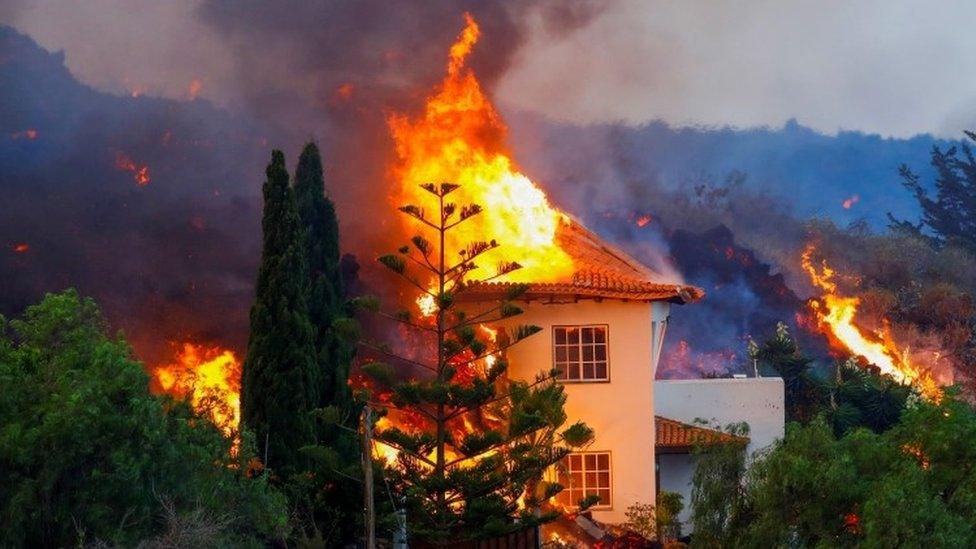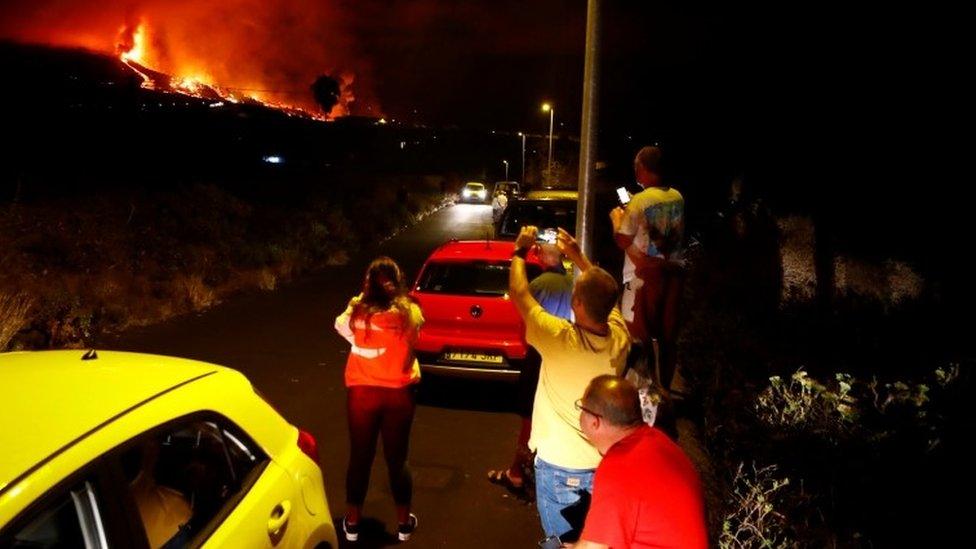Canary Islands: Lava from erupting volcano destroys homes
- Published
Canary Islands: Lava destroys homes on La Palma
A volcano eruption on La Palma in the Spanish Canary Islands has destroyed houses and forced about 5,500 residents to evacuate.
Lava from the Cumbre Vieja volcano has been pouring downhill since Sunday's eruption, devastating everything in its path.
Local officials said about 100 houses have been destroyed so far.
The Spanish Prime Minister Pedro Sánchez flew to La Palma on Sunday to oversee rescue efforts.
Mr Sanchez said authorities are closely monitoring fires that may start from the burning lava. The military and civil guard has been deployed to help.
"The lava left absolutely nothing in its path," local mayor Sergio Rodriguez told Spanish broadcaster TVE, adding that residents would not be returning home for a while.
No casualties have so far been reported. There were mandatory evacuation orders for four villages and temporary shelters were set up.
Further evacuations are unlikely to be necessary, Canary Islands President Angel Victor Torres said on Monday.

Lava from the Cumbre Vieja volcano has destroyed several homes in nearby villages on La Palma
Regional airline Binter was forced to cancel four flights on Sunday due to the eruption but Spain's civil aviation authority has emphasised that the airspace above the islands remains open.
Around 500 tourists have also been evacuated by authorities.
Regional leader Ángel Víctor Torres said the volcano is expected to be active for the next few days, and the lava flow is predicted to reach the coast at around 20:00 local time (19:00 GMT).
Spain's Tourism Minister, Reyes Maroto, faced criticism after telling Canal Sur radio that the eruption was an opportunity to attract visitors to the island.
"The island is open. If your hotel is affected, we will find you another one," she said. "We can make the most of this opportunity. For the many tourists who want to enjoy what nature has brought to La Palma, they can do so in the coming weeks and months."
The volcano last erupted 50 years ago.
It lies in the south of La Palma island, which is home to around 80,000 people.
The eruption started around 15:00 local time (14:00 GMT) on Sunday and sent lava flowing down the hillside toward villages.
Jonas Perez, a local tour guide, said he could still feel tremors from the eruption.
"But now the most amazing thing, which I've never experienced, is that the noise coming from the volcano, it sounds like... 20 fighter jets taking off and it's extremely loud, it's amazing," he added.

A 2km (1.2 mile) wide exclusion zone has been set up around the lava flow as it moves down the hillside
The prime minister delayed his departure for the UN General Assembly in New York to meet the Canary Islands' president to discuss the emergency services' response to the eruption.
"Everything is going according to plan, and therefore the priority is to guarantee the safety of the citizens of La Palma who could be affected as a consequence of this eruption," Mr Sánchez said on Sunday.
La Palma had been on high alert after more than 22,000 tremors were recorded in one week around the volcano.
The Canaries, an archipelago of seven islands off north-west Africa, last recorded a volcanic eruption in 2011, undersea off El Hierro island.
Cumbre Vieja last erupted in 1971 and in 1949.
'I saw how many houses were covered by lava'
Residents on the island have expressed shock at the sudden eruption.
"When the volcano erupted today, I was scared. For journalists it is something spectacular, for us it is a tragedy. I think the lava has reached some relatives' houses," Isabel Fuentes told the broadcaster TVE.
"It's exciting," Monica, a teacher on the island, told the newspaper El País. "But at the same time it's worrying, because there are many houses threatened by lava."
Sergio Sarti told the BBC's Newsday programme that he was hiking on La Palma when the volcano started to erupt.
"I fear further big eruption of the volcano," he said. "It's like 200 metres altitude of fire, and then a big river of lava that is going closer and closer to the coast. I saw how many houses were covered by lava, and families crying. We didn't expect this to happen now. I was walking near the volcano when it explode[d]. I didn't expect it. This is amazing."

How will you be affected by the eruption? Have you been evacuated? Email haveyoursay@bbc.co.uk, external.
Please include a contact number if you are willing to speak to a BBC journalist. You can also get in touch in the following ways:
WhatsApp: +44 7756 165803
Tweet: @BBC_HaveYourSay, external
Please read our terms & conditions and privacy policy
If you are reading this page and can't see the form you will need to visit the mobile version of the BBC website to submit your question or comment or you can email us at HaveYourSay@bbc.co.uk, external. Please include your name, age and location with any submission.